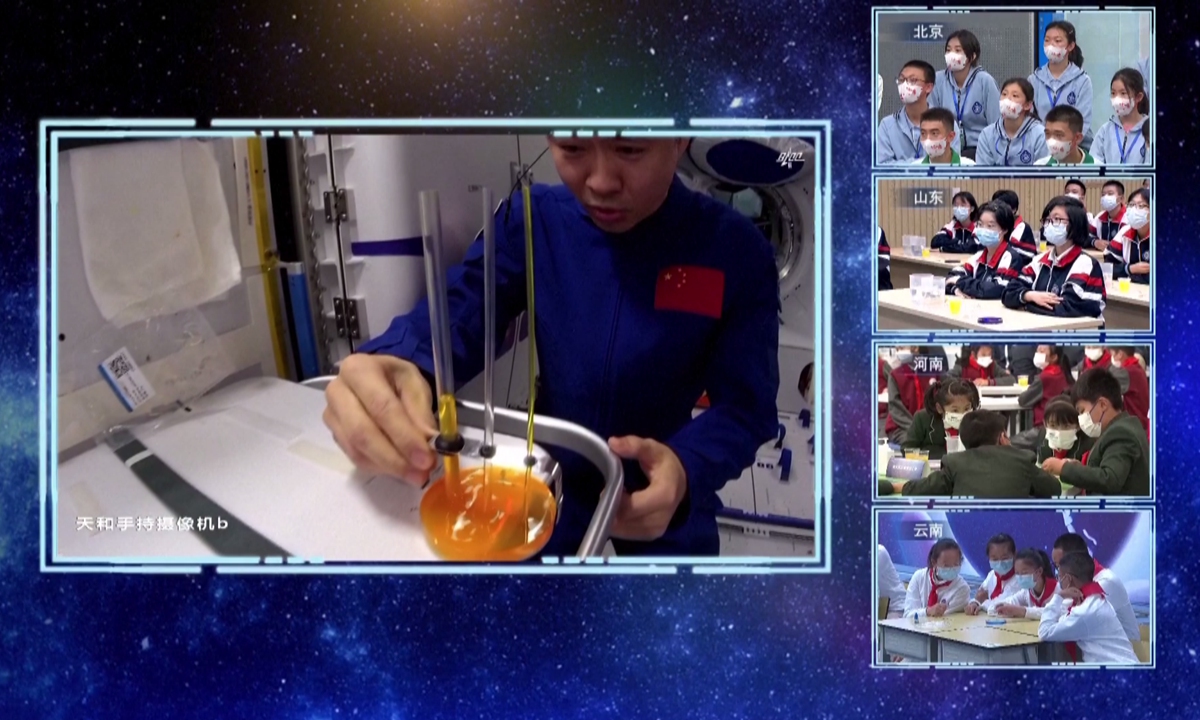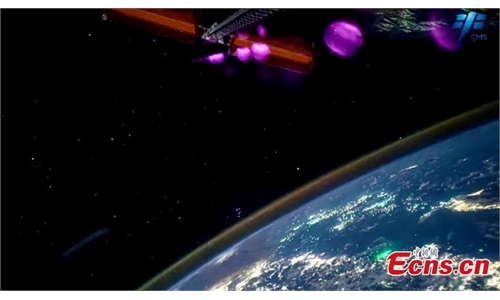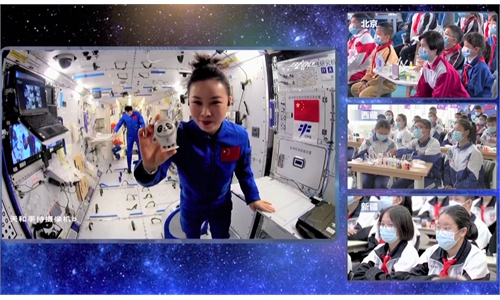
Chinese taikonaut Chen Dong demonstrates the capillary phenomenon of fluids in weightless environment from China's space station to students during the third session of Tiangong Classroom lecture series through livestreaming on October 12, 2022. Photo: CFP
Taikonauts of the Shenzhou-14 crew delivered the third session of the Tiangong Classroom lecture series live from the China Space Station Wentian lab module on Wednesday afternoon. It was the Shenzhou-14 crew's first space lecture and also the first time that such a lecture session had been staged in the recently launched Wentian module.
More than 400 students including those at the main classroom venue of Technology and Engineering Center for Space Utilization under the Chinese Academy of Sciences (CAS) in Beijing, and from other classroom venues including the Heze Number One Middle School in East China's Shandong Province, Henan Science and Technology Museum in Central China's Henan Province, and Dali New Century Middle School in Southwest China's Yunnan Province, attended the Wednesday lecture.
Shenzhou-14 manned spaceflight mission commander Chen Dong and his fellow crew members Liu Yang and Cai Xuzhe, during the Wednesday session, introduced the interior of the Wentian module, showing the dormitory and living area as well as scientific cabinets inside the new module.
Interestingly, different from the "horizontal" bedrooms in the Tianhe core module, the dormitory in the Wentian is vertical by design, aiming to save space in the lab module. There is also a space bicycle similar to the one in the Tianhe core module in the Wentian living area.
Chen, the mission commander, presented the scientific glove cabin and practiced sampling operations for the thale cress plants onboard with the help of a pair of mixed reality goggles. According to Chen, the device could provide an airtight and clean operation space in the lab module and could be used to carry out macrometer-level experiments such as cell penetration with high precision.
It can also provide low-temperature storage conditions ranging from - 80 C to 4 C, according to different experiments' requirements.
Liu presented the life and ecology experiment cabin, and likened the device to a space hotel for different species. It is expected to improve humankind's understanding about life itself and explore the influence of microgravity on life, among other life science goals.
The seeds of thale cress and rice plants were brought to the space hotel by taikonauts on July 28. After growing for 54 days in space, the rice seeds have entered a seed maturity stage from the pustulation period. On September 21, taikonauts sampled some of the rice plants and put them into a freezer for storage, and they will bring these samples back to Earth for further analysis. The harvested rice plants successfully grew regenerated rice.
A biological technology experiment cabin and a variable gravity experiment cabinet inside the Wentian module were also presented by Chen and Liu at the session. Cai played the role of the cameraman mostly during the event.
Just like previous Tiangong Classroom lecture series, Chen and Liu demonstrated a number of quite interesting physics phenomena in the weightless environment, such as the capillary phenomenon in space and the different behaviors of liquid and liquid-solid mixtures under the same impact, after which they explained the science behind them.
In the routine question and answer interaction, the Shenzhou-14 taikonauts encouraged the young students to study hard and dream big, and wished they could build the country's permanent space home even better.
The Beijing Space Information Transmission Center deployed the Tianlian-1 03 and Tianlian-2 01 relay communication satellites to support the Tiangong Classroom lecture on Wednesday, which lasted some 45 minutes, ensuring the smooth and reliable two-way transmission of sound and images between the taikonauts in orbit and the ground audience.
It demands long-term and continuous monitoring and control over the China Space Station to realize the space classroom lecture. However, due to the curvature of the Earth, it is difficult for a traditional ground station to meet such requirements, Shan Changsheng, chief engineer with the Beijing center, explained.
"Thanks to the relay satellites that are covering a bigger range with higher transmission speed, we could not only manage that but also support taikonauts' video and voice calls with the ground and their use of Wi-Fi inside the space station cabin," Shan said.
In 2013, the first-generation relay satellite network with three satellites supported China's first space lecture and starting from 2021, two generations of relay satellites have successfully supported three events in the Tiangong Classroom lecture series, according to the Beijing center.
The Tiangong Classroom lecture series, taking place episode after episode, shows the growing strength of China's space technology, and witnesses the advancement of China's space-based space monitoring and control industry, Shan noted.



